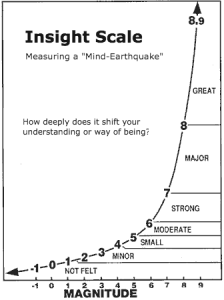
With any insight, the basic thing we realize is the truth. However, we can have insights into two different types of truth: psychological truth and meditative truth.
Psychological truths are unique-to-us, story-based, and subject to change—like realizing our life’s purpose is to be a community leader, what our true values are or why we always seem to be late everywhere. This is also referred to as relative or personal truth, and is often pursued in a therapy room.
Meditative truths are universal-to-everyone, nature-based, and will never change—like realizing that anger is merely a combination of fluctuating sensation, cognition and feeling, or that there’s a subconscious belief that gives rise to it. Or, deeply seeing that “I am not my thoughts,” and how “I have profound choice on whether to indulge a thought or to let it pass.” This is also referred to as ultimate or absolute truth, and is often pursued in meditative practice.
To this point in the series I’ve given two examples of insight. One was about a community elder who realized that people were more important than possessions. The other was about two people having insight into healthy eating.
Both of those were psychological truths. While both situations present insights that many people could relate to, they don’t deal with the fundamental building blocks of consciousness. Continue reading →

 1. Past Happenings
1. Past Happenings






